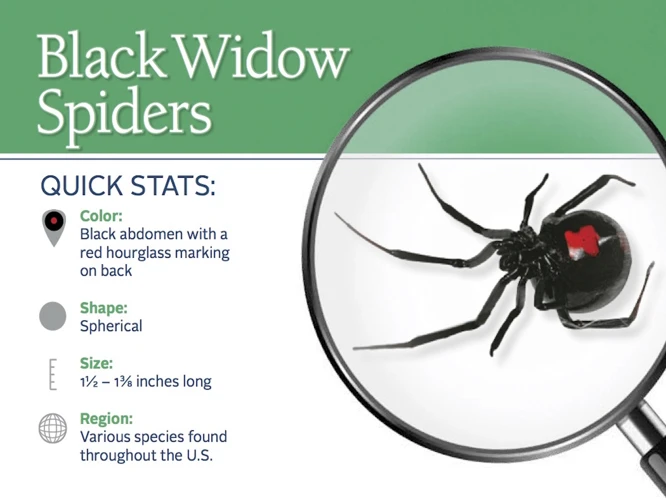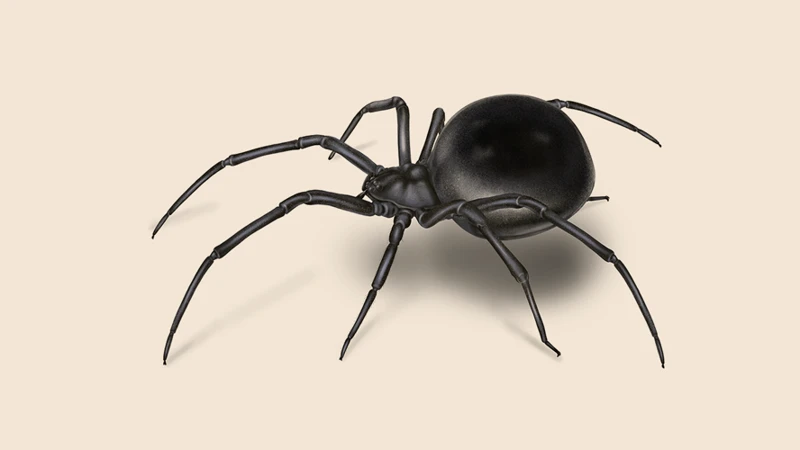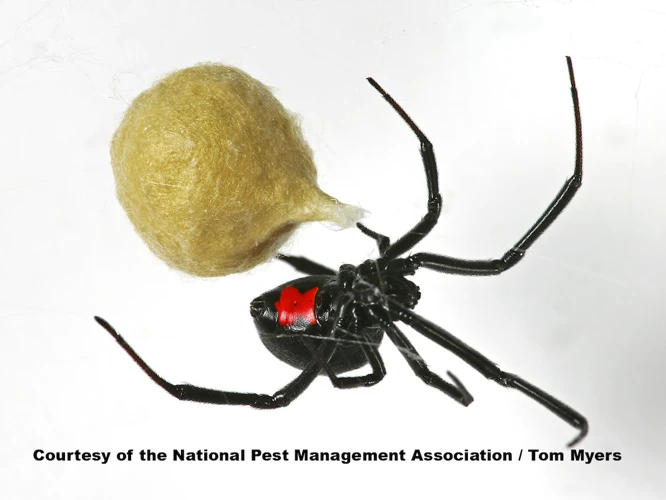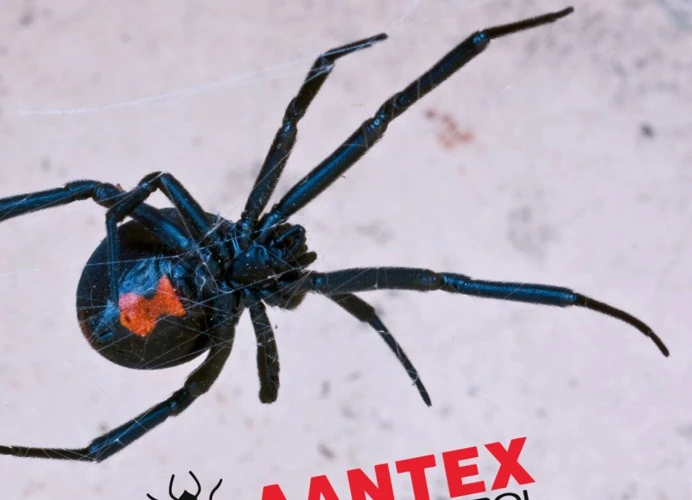As you go about your day-to-day life, the last thing you want to worry about is encountering a black widow spider in your own home. These venomous spiders are known for their distinctive appearance and potentially harmful bites. How do they get into homes? What are the signs of infestations? And most importantly, how can you keep them away? In this article, we’ll explore the causes and solutions of black widow spiders in homes, as well as ways to protect yourself against them.
Causes of Black Widow Spiders in Homes

Many homeowners experience the unnerving surprise of discovering a black widow spider in their home. These venomous arachnids can cause serious harm, making it important to understand the causes of their presence. From accidental entry to seeking shelter and food, there are multiple reasons these spiders may find their way inside. To prevent black widow spiders from entering your home, it’s important to take necessary precautions. Learn more here about the various causes that may lead to black widow spiders in your home and how to keep your space arachnid-free.
Accidental entry
Black Widow Spiders may enter your home accidentally through various means. These spiders could be present in any type of goods that are shipped from Black Widow-infested areas. For example, if you recently got a shipment of boxes from an infested area, it is possible that some spiders could be hiding inside the boxes. Additionally, an unusual but possible way for Black Widow spiders to enter homes is through ventilation or air conditioning systems. For instance, if there is an infestation outside your home, the spiders could get sucked into your ventilation system, which can then disperse them throughout your house. Generally, the spider comes in search of shelter and food.
It is important to keep in mind that although Black Widow spiders may accidentally enter your home, it does not mean that you are safe from their venomous bites. Taking preventative measures is necessary to keep them out of your home and to ensure safety.
Seeking shelter and food
Black widow spiders enter homes seeking shelter and food. These arachnids are generally found in warm, dry environments, making homes an attractive place to live. They can enter homes through small cracks or gaps in doors, windows, and walls. They are also known to hitchhike on furniture and plants that are brought inside.
Once inside, black widow spiders can find suitable hiding places to build their webs. They prefer cluttered areas like basements, garages, and attics where they can remain undisturbed. They also like to build webs in corners, behind furniture, and other hidden places where they can easily catch their prey.
Black widow spiders feed on insects like ants, cockroaches, and flies. They also prey on other spiders, which can lead to territorial disputes with other spider species. For this reason, it’s important to keep a clean home and reduce clutter so that the spiders have fewer places to hide and fewer prey options.
To prevent black widow spiders from entering your home, it’s important to take steps to seal any entry points. This can include caulking gaps and cracks, repairing damaged screens, and installing weather stripping. You can also make your home less attractive to spiders by reducing clutter, vacuuming regularly, and keeping food in sealed containers.
Additionally, you can use pesticides and natural remedies to keep black widow spiders away from your home. Pesticides like pyrethroids can be effective in killing black widow spiders, but they can also be harmful to humans and pets. Natural remedies like peppermint oil, vinegar, and chestnuts can also be effective in repelling spiders without harmful side effects.
If you do find black widow spiders in your home, it’s important to take precautions to avoid being bitten. This includes wearing gloves and long sleeves when handling clutter and debris, and using caution when reaching into dark corners and crevices. If you are bitten, seek medical attention immediately.
Black widow spiders are attracted to warm, dry environments and can enter homes by hitchhiking on furniture and plants, or through small cracks and gaps. To keep them away, seal entry points, reduce clutter, and use pesticides or natural remedies. Avoid being bitten by taking precautions when handling clutter and seek medical attention if bitten.
Signs of Black Widow Spiders in Homes

It’s important to know the signs of a black widow spider infestation in your home to prevent any dangerous encounters. Black widow spiders are known for their venomous bites, and can be easily identified by specific signs and characteristics. Keep an eye out for these visual cues to identify if you have black widow spiders in your home.
Webs
Webs: One of the most common signs that black widow spiders have made their way into your home is the presence of their webs. These spider webs are usually irregular and dense in texture, compared to other spider webs that are more organized. The webs can be found in corners, basements, attics, and other dark, quiet areas of your house where the spider is hiding. Black widow spiders build these webs to snare their prey, which is usually other insects like flies and ants. Their webs can be recognized by a few unique characteristics- they are usually very sticky and strong, and they are often disorganized or haphazard.
If you have noticed webs in your home that match this description, it is important to check for other signs of black widow spiders to confirm your suspicion. You can do this by looking for spiderlings or exoskeletons, or by checking for the characteristic red hourglass-shaped marking on their abdomens. It is important to take quick action to protect yourself and your family from a potentially dangerous bite. To prevent black widow spiders from entering and infesting your home, you may consider sealing entry points, removing hiding places, and making your home less attractive to spiders. If you fear that you or someone in your household has been bitten by a black widow spider, it is important to seek medical attention right away. For more information on identifying black widow spider webs, please follow the provided link.
Spiderlings
Spiderlings are the younger version of black widow spiders. The spiderlings of black widows are often lighter in color than the adults. They have a yellow or white line or spot on their abdomens. Spiderlings are a sign that black widows have reproduced in your home. These baby spiders typically stay near their mother’s web, so if you find spiderlings, it’s likely a female black widow is nearby.
One way to identify spiderlings is by observing their shape. Spiderlings are shaped like a teardrop, and their bodies are smaller than a grain of rice. They have eight legs, two of which are longer than the others. This creates a unique leg arrangement that is characteristic of all spiderlings.
Another way to identify spiderlings is by observing their behavior. Black widow spiderlings are cannibals. They will eat their siblings or anything else they can catch, so you may find spiderling carcasses near the web.
If you have spotted spiderlings in your home, it’s a good idea to contact a professional exterminator to take care of the infestation. Prevention is also key to keeping spiderlings and black widows out of your home. Ensure that all potential entry points to your home are sealed, and remove any clutter or debris around the exterior of your home.
Exoskeletons
Black Widow Spiders are known for building their webs in dark and quiet areas. One of the signs that they are present in your home is finding exoskeletons, or the outer shell that spiders shed as they grow. These exoskeletons look like intact spiders but are actually empty shells. They indicate that a spider has grown and molted, leaving behind its old shell.
To identify if the exoskeleton belongs to a Black Widow Spider, look for the red hourglass marking on the abdomen. If you find these exoskeletons in your home, it’s a clear sign that Black Widow Spiders have been present in the area.
To prevent Black Widow Spiders from entering your home, it’s important to seal all entry points such as cracks in walls, doors, and windows. You can also make areas less attractive to spiders by keeping them clean and well-lit. If you do find Black Widow Spiders in your home, it’s important to take action immediately as their bites can be dangerous. You should also learn to identify their webs as they are another sign of their presence.
Remember, Black Widow Spiders are dangerous and can cause serious harm if not dealt with properly. If you suspect a black widow spider bite, seek medical attention immediately. For more information on outdoor precautions to prevent Black Widow Spider bites, visit Outdoor Precautions for Black Widow Spider Bites or learn about the symptoms and first aid for black widow spider bites at Black Widow Spider Bite First Aid and Black Widow Spider Bite Symptoms.
Dangers of Black Widow Spiders in Homes

Black widow spiders are not only unpleasant to have around the house but also pose a number of serious dangers to humans and pets. These spiders are known for their venomous bite, which can cause severe pain, muscle cramps, and other symptoms. In some cases, a black widow spider bite can even be life-threatening, particularly in children, the elderly, or those with weakened immune systems.
The venom of black widow spiders is neurotoxic, which means it attacks the nervous system. The bites of these spiders can cause intense pain and muscle cramps that may spread throughout the body. In some cases, the venom can even cause seizures, paralysis, and respiratory failure. This is why it is important to seek medical attention immediately if you suspect that you have been bitten by a black widow spider.
It is worth noting that not all black widow spiders are dangerous to humans. The majority of bites occur when people accidentally disturb the spider or step on it, which can trigger a defensive bite. It is important to be aware of your surroundings and take precautions when handling items outdoors or in dark, secluded areas where black widow spiders are likely to hide.
In addition to the dangers posed to humans, black widow spiders can also be harmful to pets. This is especially true for small animals such as cats and dogs, which are more vulnerable to the venom than humans. If you have pets, it is important to keep them away from areas where spiders are likely to hide, such as in garages, basements, or crawl spaces.
It is important to note that there are many misconceptions about black widow spiders. For example, some people believe that all female black widow spiders are dangerous and can easily kill humans. In reality, only the female black widow spider has venom glands, and even then, not all bites are dangerous. Many people assume that black widow spiders are aggressive and will attack humans on sight. This is also a misconception, as black widow spiders generally only bite when they are threatened or provoked.
Black widow spiders can pose serious dangers to humans and pets. Their venomous bites can cause a range of unpleasant symptoms, with potentially life-threatening consequences in some cases. To avoid the risk of black widow spider bites, it is important to take measures to eliminate their presence in and around your home, and to seek medical attention immediately if you suspect that you have been bitten.
How to Keep Black Widow Spiders Away from Homes

Keeping black widow spiders away from your home is crucial to ensure the safety of your family and children. Black widow spider bites are painful and can cause serious health complications. To prevent these spiders from entering your home, it’s important to take proactive measures. In this section, we will discuss effective ways to keep black widow spiders out of your house, from sealing entry points to using natural remedies and pesticides. By following these simple steps, you can ensure that your home remains free of black widow spiders and the risk of bites is minimized. So, let’s get started!
Sealing entry points
Keeping black widow spiders out of your home is one of the most effective ways to prevent spider bites. Sealing entry points is a crucial step in preventing black widow spiders from making their way into your home. It is essential to inspect your home for any potential entry points and seal them off.Inspecting for webs is a good way to locate potential entry points as black widow spiders create distinctive webs.
Common entry points for black widow spiders:
| Entry Point | Solution |
|---|---|
| Doors and Windows | Make sure doors and windows are tightly sealed and do not have any gaps. Install weatherstripping to seal any gaps around doors, and use screens for windows. |
| Vents and Pipes | Inspect vents and pipes frequently and cover them with fine wire mesh to prevent spiders from entering your home through them. Check the dryer vent, air conditioning, and heating vents, as well as any other external pipes that may enter your home. |
| Cracks and Holes | Seal any cracks and holes in your walls and foundation, especially those located near the baseboards. Use caulk or foam sealant to fill any gaps and repair any damage to the foundation. Pay close attention to areas around pipes, wires, and cable entry points. |
By sealing these entry points, you can reduce the chances of black widow spiders entering your home. Taking the time to seal these gaps and openings can significantly reduce the spider population in your home. Whether you are a homeowner or renter, sealing your home’s entry points should be a top priority.
Making your home less attractive to spiders
Making your home less attractive to spiders is a crucial element in preventing a black widow spider infestation. By eliminating their preferred habitats and prey, you can reduce the appeal of your home to spiders. Here are some ways to make your home less attractive to spiders:
| Tip | Description |
|---|---|
| Declutter | Black widow spiders like dark and tight places. They can hide in boxes, stacks of clothes, or other clutter. Keep your home clean and organized to eliminate possible hiding spots. |
| Outdoors Lighting | Spiders are attracted to dark areas, so keeping your house well-lit at night can help to deter them from coming close. Consider installing outdoor lighting to deter spiders from coming close to your house. |
| Store firewood properly | Black widow spiders love woodpiles and can use them as a nesting site. If you use wood for your fireplace or barbecue, keep it away from the house and off the ground. |
| Check exterior doors and windows | Seal gaps and crevices in window and door frames to prevent spiders from coming in. |
| Food crumbs | Black widow spiders eat other insects, so keeping your home free of food crumbs and other debris can make your home less attractive to other insects that can serve as prey for black widows. |
By following these tips, you can significantly reduce the likelihood of black widow spiders infesting your home. By making your home less attractive to spiders, you send a message that they are not welcome in your living space.
Using pesticides and natural remedies
When it comes to getting rid of black widow spiders in homes, using pesticides and natural remedies are among the most popular options. However, it is important to use caution when using pesticides, as they can be harmful to humans and pets if not used correctly. On the other hand, natural remedies can be a safer alternative, but may not be as effective in completely eliminating the spiders.
Pesticides
There are various pesticides available that are effective in killing black widow spiders. Some of these include:
| Pesticide | Active Ingredient | Pros | Cons |
| Insecticidal dusts | Pyrethrins | Effective in killing spiders that come into contact with it | Can be harmful to humans and pets if inhaled |
| Sprays | Pyrethrins or pyrethroids | Can kill spiders on contact and provide residual control | May require multiple treatments to fully eliminate the spiders |
| Traps | N/A | Can be effective in catching spiders | May not kill the spiders, just trap them |
Before using pesticides, be sure to carefully read and follow the instructions on the label. It is also recommended to wear protective gear, such as gloves and a mask, when applying pesticides to avoid exposure.
Natural Remedies
Alternatively, there are also natural remedies that can be used to deter black widow spiders from entering your home. Some of these include:
- Peppermint oil: Spiders don’t like the smell of peppermint, so spraying a mixture of water and peppermint oil around entry points can help keep them away.
- Vinegar: Vinegar can be used to repel spiders as well. Mix vinegar with water and spray around entry points and other areas where spiders may be present.
- Citrus: Spiders also don’t like the smell of citrus. You can use lemon or orange peels around your home to deter them.
It is important to note that natural remedies may not have the same potency as pesticides and may not completely eliminate the spiders. However, they can be a safer alternative to using chemicals in your home.
Internal html link: If you’re interested in learning more about the role of the venom gland in black widow spiders, read our article on Understanding the Role of the Venom Gland in Black Widow Spiders to gain more insight.
What to Do If You Find Black Widow Spiders in Your Home
Discovering a black widow spider in your home can be a terrifying experience, but it’s important to handle the situation carefully and calmly. The best course of action is to call a pest control professional who can safely remove the spider for you. If you do decide to remove the spider yourself, it’s important to wear gloves and protective clothing to avoid getting bitten.
It’s important to note that killing a black widow spider can actually be more dangerous than leaving it alone. When a black widow is threatened, it will often retreat to its web and hide. If you try to kill it, you may actually end up driving it deeper into your home where it could pose a greater danger to you and your family.
If you or a loved one is bitten by a black widow spider, it’s important to seek medical attention immediately. The bites of black widow spiders can cause severe reactions, especially in children and the elderly.
Remember, prevention is the key to keeping black widow spiders out of your home. By taking steps to seal entry points, keep your home clean and clutter-free, and use natural remedies or pesticides, you can significantly reduce the chances of black widow spiders making their way inside.
If you want to learn more about black widow spiders and their behavior, you can check out our article on male and female black widow spiders or read up on common misconceptions about these spiders. Additionally, if you have pets, it’s important to know how to keep them safe from black widow spiders. Check out our article on how black widow spiders can be dangerous to pets for more information.
Conclusion
In conclusion, dealing with black widow spiders in your home can be a daunting task. However, with the right knowledge and tools, you can prevent them from taking up residence in your life. Remember to always be aware of the possible causes of black widow spiders in your home and take necessary precautions to seal off any entry points. Regularly cleaning areas where spiders tend to hide and using natural remedies or pesticides can also be effective in keeping these spiders at bay. If you do happen to spot any signs of black widow spiders in your home or suspect an infestation, it is important to take immediate action by calling a professional pest control service. With these steps, you can ensure the safety and well-being of yourself and your family from the dangers of black widow spiders. Stay vigilant and proactive in keeping these creepy crawly critters out of your home.
Frequently Asked Questions
What do Black Widow Spiders look like?
Black Widow Spiders are shiny black with an hourglass shape on their abdomen. Females may have a red or orange hourglass while males may have red or white spots on their abdomen.
Are Black Widow Spiders common in homes?
Black Widow Spiders are not extremely common in homes, but they can still make their way inside. It is important to take preventative measures to keep them out.
What are some common causes of Black Widow Spiders entering homes?
Black Widow Spiders may accidentally enter homes through open doors or windows or seek shelter and food inside. They may also be brought in through infested items.
Are Black Widows poisonous?
Yes, Black Widow Spiders are venomous. Their bites can be dangerous and even life-threatening, especially to children, the elderly, and those with compromised immune systems.
What are some signs of Black Widow Spiders in homes?
Webbing, spiderlings, and exoskeletons are all signs of Black Widow Spiders. It is important to check dark and cluttered areas of the home, such as basements and garages.
How can I prevent Black Widow Spiders from entering my home?
Sealing entry points, keeping your home clean and clutter-free, and using pesticides or natural remedies can all help to prevent Black Widow Spiders from entering your home.
What are some natural remedies for controlling Black Widow Spiders?
Essential oils, such as peppermint and tea tree oil, can help to repel Black Widow Spiders. Diatomaceous earth can also be effective in killing spiders.
What should I do if I find a Black Widow Spider in my home?
If you find a Black Widow Spider in your home, do not handle it. Call a professional pest control service to safely remove the spider and eliminate any infestation.
Can I keep Black Widow Spiders as pets?
We do not recommend keeping Black Widow Spiders as pets due to their venomous bites, which can be dangerous to humans and other pets.
Are Black Widow Spiders aggressive towards humans?
Black Widow Spiders are not aggressive and will usually only bite if they feel threatened or are disturbed. It is important to use caution and respect these spiders in the event that you come across one.






